Madhavan Touts GUMC’s Commitment to Data Science and Informatics at Symposium
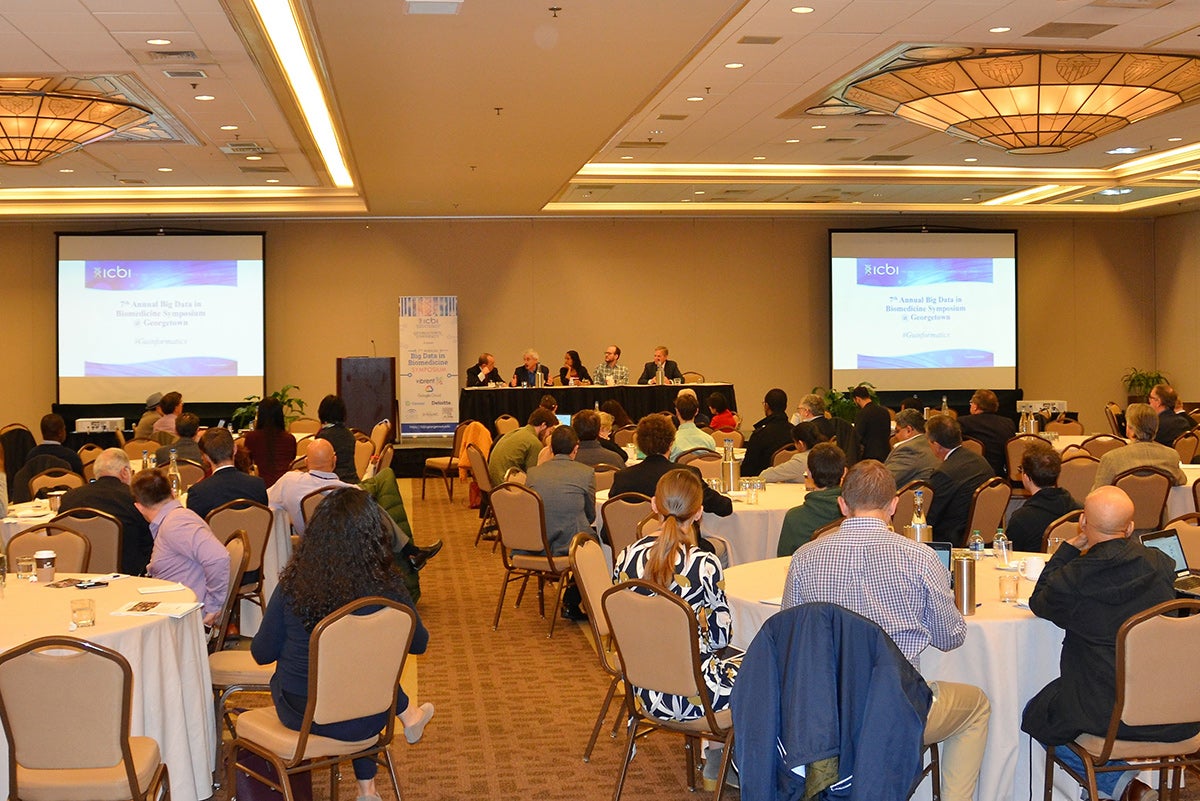
Posted in GUMC Stories | Tagged big data, biomedical informatics, biomedical research, ICBI
(November 3, 2018) — In front of an audience steeped with big data professionals, Subha Madhavan, PhD, beamed as she announced Georgetown University Medical Center (GUMC)’s new investment in digital health and scientific big data — the new Office of Health Data Science and Informatics (OHDSI). The announcement provided momentum for the Seventh Annual Big Data in Biomedicine Symposium, founded by Madhavan.
The symposium brought together over 350 innovators, research scientists, clinicians, educators and students to exchange ideas, learn new methodologies and network. Speakers included experts in big data, data science and biomedical informatics from academia, government and industry — all of them eager to share their knowledge and learn innovative approaches to improve patient health and health care.
Madhavan, an internationally recognized leader in the field who serves as director of the Innovation Center for Biomedical Informatics (ICBI) and as a professor in the department of oncology, will lead OHDSI as GUMC’s inaugural chief data scientist and associate dean for health data science and informatics.
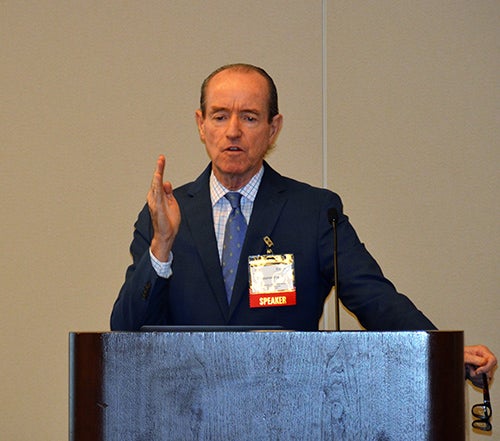
“I [also] believe that Subha’s leadership and expertise can be transformational and will be of immense benefit to lead the Office of Health Data Science and Informatics as we strive toward increasing excellence and national recognition in our research and academic programs,” said Edward B. Healton, MD, MPH, executive vice president for health sciences and executive dean of Georgetown University School of Medicine, in an internal announcement.
Stephen R. T. Evans, MD, executive vice president for medical affairs and chief medical officer for MedStar Health, gave introductory remarks at the symposium.
“Big health care systems are desperate for big data — and Subha is going to be able to play in those data sets. It’s all about the intersection of looking at university intellectual horsepower and how do you answer some of the bigger, more complex questions inside of a health care system,” he said.
Well-Positioned to Face Urgent Tasks
Improving medical diagnoses, discovering new treatments and therapies, enhancing drug delivery and boosting efforts in precision medicine, are all long-term tasks that the OHDSI has been charged with, and which Madhavan is well-positioned to oversee.
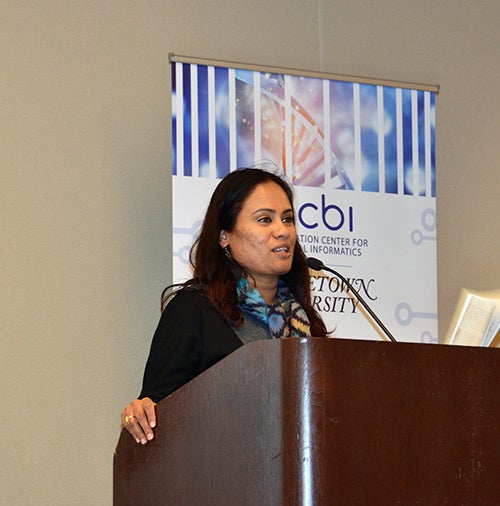
Having led several biomedical informatics efforts in the past, Madhavan is well-versed in the life-saving impact bioinformatics can have on increasing the depth and statistical strength of both basic science and clinical research. For example, REMBRANDT (REpository for Molecular BRAin Neoplasia DaTa), an online collection of brain cancer biomedical data recently made free and open in the Georgetown Database of Cancer and used by thousands of researchers all over the world, was recognized in a tweet by former Vice President Joe Biden for its transformative potential to impact research.
“6.6 million — that’s how many spots on the human genome scientists look at to calculate a person’s risk of developing coronary artery disease. This is for one patient, so you can do the math,” Madhavan said, demonstrating the exigency of such an office.
Accordingly, “Study design and biostatistics are critical components of OHDSI,” Madhavan explained. Because of her team’s expertise in those areas, the new office will serve as the main resource for all GUMC department leaders as they launch and execute data science initiatives moving forward.
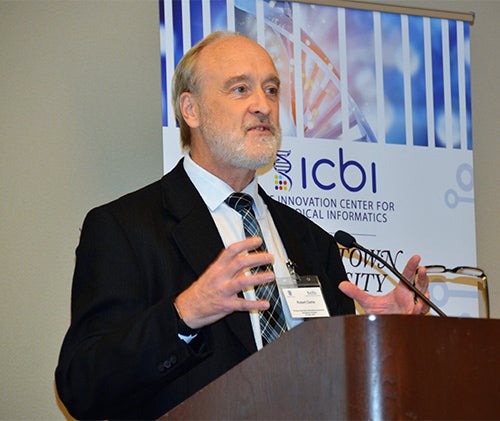
In addition, she will work to ensure that the emerging areas of artificial intelligence and machine learning are optimized as tools through which GUMC is able to continue meeting its missions of research and education, as well as patient care through its clinical partner, MedStar Health.
These functions, along with developing external partnerships with national labs, federal agencies, and with the life sciences and information technology industries, will allow GUMC to join other areas of academia in incorporating data and computational approaches into its work.
“We have a very strong tradition of education at Georgetown, we follow the Jesuit tradition of cura personalis, and it’s that holistic view of a person that allows us to think differently about some of these issues,” said Robert Clarke, PhD, DSc, dean for research at GUMC.
“And these data sets and what’s in them have implications when it comes to ethics — and that’s why Georgetown is a unique place to have this.”
Conference Draws Variety of Attendees
Hosted at the Georgetown University Hotel and Conference Center, the two-day program was varied, with a full day of pre-symposium workshops in immuno-oncology informatics, data visualization in R, and EHR data mining.
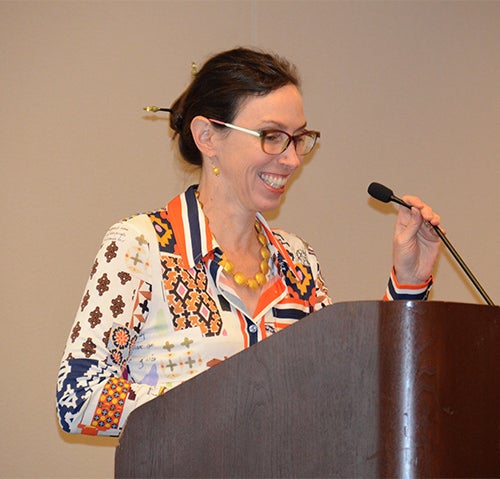
It also featured a full day of panel discussions, a poster session and spotlight talks from Melissa Haendel, PhD, associate professor of medical informatics and clinical epidemiology at the Oregon Health and Science University School of Medicine, who described open science efforts at the National Institutes of Health to improve reproducibility in research, and Neal Meropol, MD, vice president of research oncology at Flatiron, who spoke about using data and tools to improve health outcomes, reducing barriers to clinical trial participation, and improving the economic impact of care.
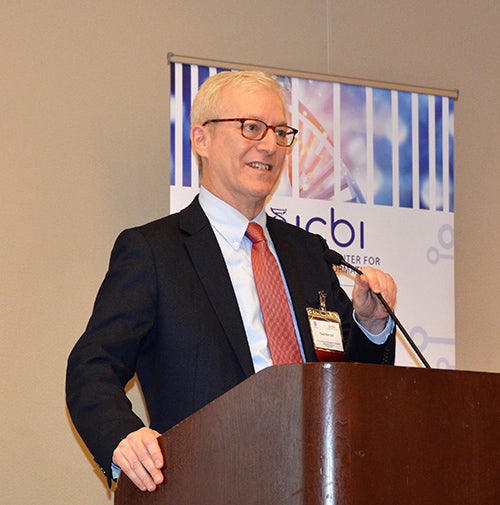
Among the session topics were “Rise of Digital Citizen” featuring John Lock, interim vice president and chief digital officer at MedStar Health, and Mark Smith, MD, chief innovation officer and director of the MedStar Institute for Innovation; and “Educating the Next Generation of Health Data Scientists” led by Shameer Khader, PhD, senior director of advanced analytics at AstraZeneca and Andrew Ritcheson, PhD, PMP, from Deloitte. In addition, “Power of Real World Evidence” and “Next Generation Data Commons” were sessions that attendees could join.
Sponsors of the Seventh Annual Big Data in Biomedicine Symposium included Vibrent Health, Google Cloud, ESAC: Enterprise Science and Computing, Elsevier, Deloitte, Caris Life Sciences, Cerner, Georgetown-Howard Universities Center for Clinical and Translational Science (GHUCCTS), Georgetown Lombardi Comprehensive Cancer Center, and the MedStar Health Research Institute.
Seren Snow
GUMC Communications
